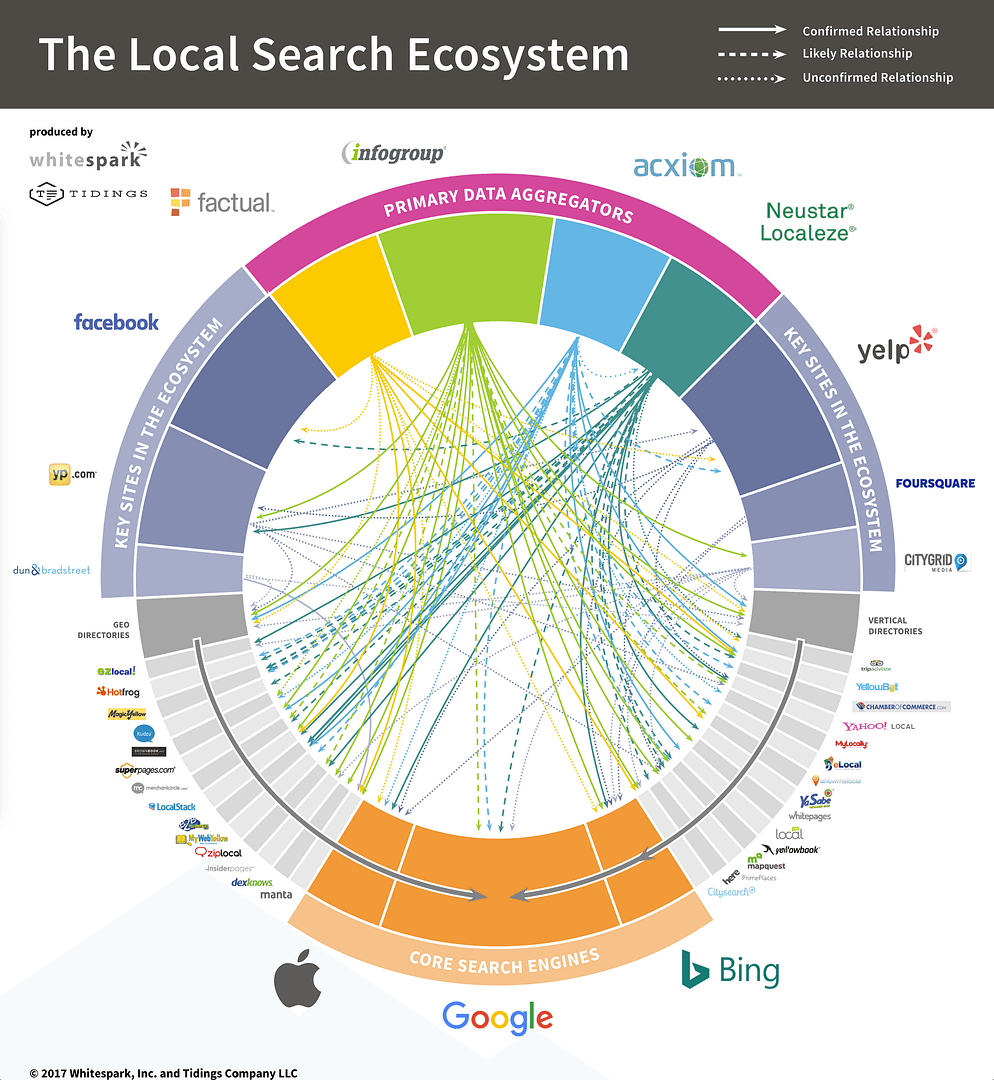The folks at Whitespark just released the 2017 Local Search Ecosystem graphic. Here’s how to use it to boost your visibility in search.
In a nutshell: To maximize your search engine rankings, your business must be accurately listed on directory sites that match your industry and location, plus general directories and major search engines.
Practically speaking, that means accurate information about your business, at least the name, phone number, and street address — a citation — should appear on most of the sites shown in the graphic below.
Use the interactive version. Zoom the image.
Where should your business be listed?
- Primary Data Aggregators (Factual, Acxiom, Localeze, Infogroup)
- Major Search Engines (Google, Bing, Apple)
- Key Sites (Facebook, Yelp, YP, Dun & Bradstreet, others as shown )
- Vertical Directories (eLocal, WhitePages, MapQuest, others as shown, plus directories in your industry)
- Geographic Directories (Manta, Dexknows, Brownbook, others as shown, plus directories in your local city or region)
Trust through consistency
It’s obvious how darned complex the interactions between these sites have become. There’s a great deal of information sharing.
That’s why it’s so important to make sure your business information is consistent across the board. From a search engine perspective, consistency means it’s more likely the information is correct, and therefore, trustworthy.
Trustworthy sites get the edge in search.
How to eat this elephant, one bite at a time
(No actual elephants were harmed in this metaphor)

- Start with the big boys: Google, Bing, and . . . Apple? Are you surprised to see Apple listed as a core search engine? Yahoo has imploded to less than 4% of the search market worldwide. Meanwhile Apple is driving a lot of mobile searches through iPhones. Something else: Google now supplies the bulk of Apple’s search results. So it gets down to Google + Bing. Microsoft’s Bing is a significant player, especially in desktop search.
- Next, square away your listings at the primary data aggregators (Factual, Infogroup, Acxiom, Localeze). You’ve probably never heard of these companies unless you’re an insider, but they send a great deal of data downstream. Important!
- Check all the Vertical and Geo directories in the graphic. Is your business listing present and accurate? If not, submit your information directly if the site accepts it; otherwise, wait until they get it from outside sources.
- That leaves local and industry directories. These will be unique to you and your local competitors. Want to know what citations sites your competitors are using? We have a tool that does just that; reach out to us for more information. A search for “your-niche association (or organization)” and “your-city association (or organization)” will reveal opportunities.How many local and industry citations do you need? My snarky answer is “more than the next guy”. To get in the top tier of search results, you’ll likely need 50+ general citations, 10+ local citations, and 10+ industry citations. The reputation of the site matters too; it’s better to get a citation on chamberofcommerce.com than localswimclub.com.
Consider joining some local organizations and industry associations, there are also many free directories.
